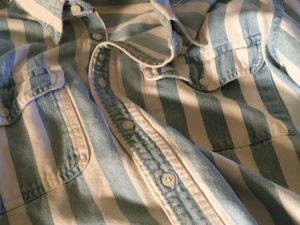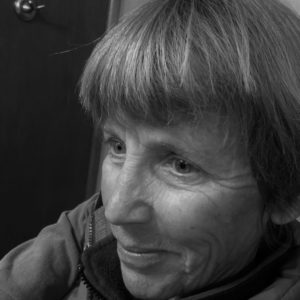 Years ago, Tillie Olsen published a slim volume of short stories called Tell Me A Riddle. In one of her best-known stories, “I Stand Here Ironing,” she paints a picture of the regrets and realities of a sometimes single, working class mother of the 1950s. At the risk of conflating narrator and author, I’ll venture that this modest record of the life of a mother/housewife/hash slinger/agitator is Olsen’s own story, and for that reason it’s a beacon for those of us who create thousands of excuses not to write. It’s both a beckoning finger and the raised hand that signals impatience. Just do it. Stop waiting for the perfect moment. Too busy? No time? Create a time. Wake up early. Get on with it, this small but mighty collection seems to say.
Years ago, Tillie Olsen published a slim volume of short stories called Tell Me A Riddle. In one of her best-known stories, “I Stand Here Ironing,” she paints a picture of the regrets and realities of a sometimes single, working class mother of the 1950s. At the risk of conflating narrator and author, I’ll venture that this modest record of the life of a mother/housewife/hash slinger/agitator is Olsen’s own story, and for that reason it’s a beacon for those of us who create thousands of excuses not to write. It’s both a beckoning finger and the raised hand that signals impatience. Just do it. Stop waiting for the perfect moment. Too busy? No time? Create a time. Wake up early. Get on with it, this small but mighty collection seems to say.
I have often wondered at the ebb and flow of creativity that plagues or delights us in equal measure. Why do we struggle so with the expression of our very selves? Because we’d prefer to hide our plight under a barrel, when in fact the articulation of that plight is what the world craves? Only connect, E. M. Forster says, and proceeds to tell us all about the trials and triumphs of early 20th-century England, embodied by his characters. And, in fact, the reader does feel connected to those lives, extraordinarily so, given the one hundred intervening years. The truth is, not much happens to us humans that hasn’t happened before. Olsen stands there ironing. She could be plotting to take over the world or coming up with street names in the newest dystopia, but in this story she’s ironing. A humble act of service. She’s earning the peace of mind that brings her to her next act of service: describing in writing the life of an ordinary person whose complications, regrets, satisfactions and moments of raw wonder are the same as yours and mine. In this way we stand with her, ironing.
On a recent rainy morning in a house surrounded by the sugar beet fields of Norfolk, England, I picked up an iron for the first time in more than 20 years. On this morning I became involved in chasing down the wrinkles of an old friend’s broadcloth shirts. The owner of the shirts, my mother’s friend Jan, is now confined to a wheelchair, though the word “confined” doesn’t describe her. Multiple sclerosis has slowly eroded her ability to walk, and she has trouble ironing, but her spirit radiates in all directions. She came to “America,” as she calls it (a softer-sounding place than “the United States”), when she was 11 years old, to escape the bombing in London. This was World War II, and our country was not yet involved. She came and lived with my mother who was just her age. For two years they were family. Jan ate her first Thanksgiving dinner at my grandmother’s table.
Thanksgiving, for her, was as un-English as she could ever imagine with its unrationed food and gaily colored vegetables covered with marshmallows. Her father had died early in the war, and while she was with my mother, my mother’s father died. So they shared death, they shared puberty, they shared the global uncertainty that marked that time. When Jan went back to London in the middle of the war, the bond between them was not broken but it was stretched. Or more accurately, it was wrinkled. The smooth easy way it once lay along the lives of those two girls who became young women and wives and mothers—the bond wavered and changed with every bump in the road. It wrinkled around husbands and children, illness and older age. It became at times unrecognizable, neglected, its old shine and polish gone. And finally it stretched thin around my mother’s death. Yet there I was, years later, in Jan’s kitchen in England, dusting off the bond, smoothing out the old connection, embarking on the radical act of ironing.
My brother, David, is the one in my family who irons. He’s a restless man, but a certain calm envelops him as he slides the iron back and forth along the sleeves of a favorite shirt or the legs of his blue jeans. He’s the only person I know who irons his underwear. He calls ironing radical because the world’s priorities have changed and ironing is no longer the necessary, prosaic act it once was, but a fool’s indulgence. He and I came of age in the era of wash-and-wear, which was the ‘50s term for polyester. Wash-and-wear, along with the dishwasher, marked the beginning of women’s crawl toward liberation. A decade later, when the bra burning began, no one gave polyester the credit it was due for bringing women out from behind their ironing boards and into the streets. But David doesn’t care for polyester or any of the other names we give to what is essentially plastic clothing. “Gosh, that plastic shirt looks great on you!” is not something we want to hear, though a shirt that survives the day unwrinkled has a lot of street cred. My brother prefers cotton. He designs houses, and his aesthetic in structures and clothing is earthy. Like Olsen, he’s a creative person dealing in the ordinary and his ideas come while he irons.
As the rain scattered and the sun came out on that early English morning, I took up my iron with the same conviction I’d take up a pen and began the steady work of laying down heat as I would language; laying down heat and pressure to cloth and smoothing the rough places where the iron left its own mark, its own wrinkle, so in the end the work seemed authorless, the shirt seemed to have smoothed itself. As this back and forth unfolded, up to the collar, down to the cuffs, across the pleat in the back and between the shell buttons, I thought about writing and how writing is most of all a matter of applying pressure and heat, and moving back and forth from ordinary thing to ordinary thing, a constant exploration of the surface texture until those ordinary things give up their relevance, their beauty, into our hands and we’re able to translate them. To do this is not a fool’s indulgence, but an act of service. This Thanksgiving Day, if you don’t see me at the table, it’s because I stand here ironing.

